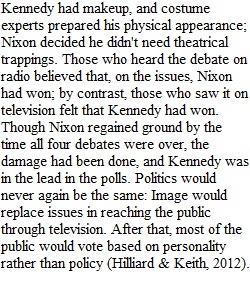


Q Please answer all of the following questions [it's an important chapter of US history that few of you know about!]. Please send me your answers via the designated link (located directly under this post within this "Assignment" section of Blackboard) by Saturday by 6:00PM. GROUP 1 1960 1) What impact did the Kennedy-Nixon debates have on politics? 2) How many American homes had TV sets, radio, and cable? 3) What shift in programming occurred between networks and advertisers? 4) What kinds of hard-hitting journalism erupted? 5) What changes/shifts did radio experience? GROUP 2 1961 6) Describe Newton Minow s efforts to improve TV. 7) How did Kennedy open up government operations to the public? 8) What format dominated TV programming in 61? 1962 9) What was the All-Channel Receiver Act? 10) What was COMSTAT? 11) Describe the top rated programming in 62? GROUP 3 1963 12) How did Minow envision TV s goals/function in his final speech? 13) What obstacle did W. Henry encounter in his initial efforts as the new FCC chair? 14) What changes in news occurred in 63? 1964 15) Describe the shift in political coverage experienced in 64. 16) What was the Fairness Doctrine? GROUP 4 1964 17) What other actions did the FCC take in 64? 18) What impact did the Surgeon General s warning on smoking have? 1965 19) How did color TV affect viewers? 20) What was the most important news in 65? 21) Describe educational TV s success/goals in 65. GROUP 5 1966 22) How were the networks implicated in distorting news coverage of Vietnam? 23) How did people power, protests and journalism affect the war? 24) What happened to Amos n Andy? 25) What response did ABC receive in attempting to merge with IT&T? 1967 26) How was the Fairness Doctrine used in 67? 27) What were underground stations? 28) How did educators affect TV in 67? GROUP 6 1968 29) Describe the socio-cultural ongoings of 68. 30) Who were the Smothers Brothers and why were they controversial? 31) What is ACT? 1969 32) What kind of educational TV emerged in 69?-- -What was Sesame Street designed to do? 33) What did the FCC do for the first time in 69? 34) What resulted from the Supreme Court decision re: the Fairness Doctrine?
View Related Questions